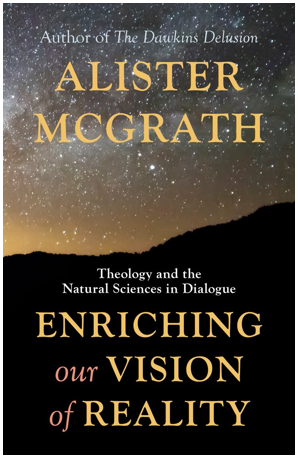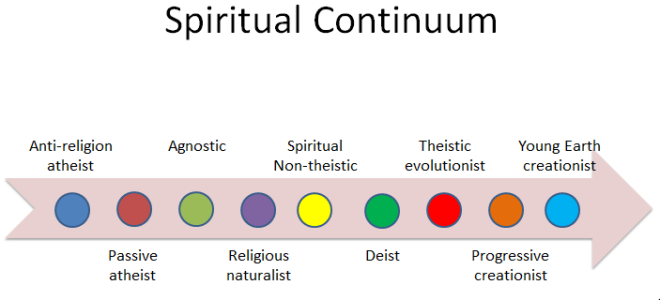I
n my ongoing journey of diving into the positive relationship between science and religion, I read Enriching Our Vision of Reality: Theology and the Natural Sciences in Dialogue by Alister McGrath. With science degrees in quantum chemistry and biology, Dr. McGrath is a Professor of Science and Religion and Director of the Ian Ramsey Centre for Science & Religion at Oxford University.
McGrath firmly believes that both science and religion are important parts of the big picture – but not the only parts. He sees science and religion are “different parts of the same reality” with each offering a different perspective. Although he unequivocally encourages readers to develop to develop an intricate understanding of nature, McGrath sees Christianity’s role (especially through the lens of natural theology) as providing greater insight into God, creation, and today’s scientific exploration.
“… both scientific and religious theories find themselves confronted with mysteries, puzzles and anomalies that may give rise to intellectual or existential tensions but do not require their abandonment. . . . In each case, there is a common structure of an explanation with anomalies, which are not regarded as endangering the theory by its proponents but are seen as puzzles that will be resolved at a later stage.”
“We all need a greater narrative to make sense of the world and our lives, naturally weaving together multiple narratives and multiple maps to give us the greatest possible traction on reality. Reality is just too complex to be engaged and inhibited using one tradition of investigation. That, I suggest, is why we need both robust theology and informed science.”
“Science dismantles the world so that we can see how things work; the Christian faith assembles them so we can see what they mean.”
 In order to understand his point of view, Dr. McGrath organizes this book in a different, but sensible, manner – three parts with multiple chapters in each part; and one part building on the next.
In order to understand his point of view, Dr. McGrath organizes this book in a different, but sensible, manner – three parts with multiple chapters in each part; and one part building on the next.
- Part 1: An explanation of the relationship between science and theology. Although some see the two as incompatible, McGrath promotes a positive relationship.
- Part 2: Because he threads his story throughout the book, McGrath uses this section to discuss the three people most influential on his point of view: Charles A. Coulson, Thomas Torrance, and John Polkinghorne (whom I’ve read).
- Part 3: These six chapters examine six parallels between science and theology: Theories & doctrines, faith, models, evolution, human identity, and natural theology.
At pertinent times throughout the book, McGrath shares his personal experiences, including his time as an atheist – so he willing responds to notable New Atheists (particularly Richard Dawkins and Christopher Hitchens. I find this interesting because I’ve read multiple authors who have been atheists in their personal journey.
Before reading this book, my concept of natural theology related back to William Paley (19th Century) who saw nature’s design and intricacies as proving God’s existence because observable design is a sign of God’s past activity. (This thought is the general overview of those favoring Intelligent Design over evolution by natural selection.) Today’s natural theology (far removed from Paley) allows people to meld scientific and theological information in order to enhance our understanding and admiration of God’s creation.
McGrath surprised me with his criticisms of Ian Barbour’s four models explaining the science-theology interchange. Although he favors Polkinghorne’s four models, I tend to stay with Barbour’s explanation. While Polkinghorne’s model may be more centered on the theological perspective, I see Barbour’s models as an easy way for the general public to understand the different levels/stages of the science-theology relationships. After all, much of the public remains stuck in the paradigm that they must make a choice between the two disciplines. My personal journey on this topic also relates very well to Barbour’s models.
This book is well-researched and documented with 27 pages of endnotes. McGrath also provide 2+ pages of further reading materials for those wanting to know more. For me, these references also reinforces the decisions I’ve made what who and what to read
Enriching Our Vision of Reality is a thought-provoking, but not an easy read for novices on the topic – therefore I believe McGrath’s intended audience are those with more than a casual interest in theology and its interrelationship with science. I wonder if pastors are his intended audience. Then again, the intended audience could be scientists in order to expand their view of theology. For anyone interested, Kindle and paperback versions are available at Amazon.


